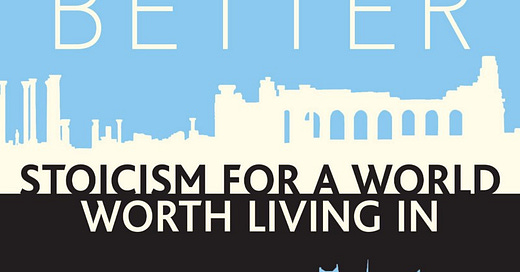Being Better: Stoicism for a World Worth Living In
Book Summary, Favorite Quotes, & Lesson Learned
Book Review
Book Summary, Favorite Quotes, & Lesson Learned
Being Better: Stoicism for a World Worth Living In is the latest book on Stoicism by Kai Whiting & Leonidas Konstantakos. The book lays out a great introduction to the philosophy for anyone new to it, and for those who are already familiar with it, provides a great refresher with modern day examples of individuals living the Stoic virtues.
Summary
The book is a perfect primer or refresher for anyone interested in the philosophy of Stoicism. Less than 200 pages, the book covers all of the main tenets of the philosophy in an easily digestible fashion and can be read over a weekend.
What I liked most about the book was the combination of the philosophy with modern day examples of how the philosophy was applicable. While many of the examples used were not of Stoics themselves, the book is a reminder about how a 2,000 year old philosophy, and the virtues that underpin it, are universal tenets to living a good life.
The book shows exactly why the philosophy is so practical; virtue is not a destination, but rather, a continuous work that we must strive for. External circumstances will always attempt to pull us away from virtue, but it is only from within that we can truly attain it.
The timeless lessons of the Stoics jump off the page in such a meaningful way that one cannot help but feel a connection to the philosophy, and all of mankind, once finished reading.
Favorite Quotes
“A principle is a proposition or value that guides our thoughts, actions, and judgment. It is the essence of our moral operating system, and not unlike a compass, it directs our steps. Given that the signposts on the Stoic path are principles rather than rules and regulations, we must think for ourselves every step of the way.”
“Virtue is not self-proclaimed but rather demonstrated through mindset and actions.”
“Virtue does not exist in a vacuum; it is revealed by our behavior and interactions and relationships with others.”
“While we may not always control the outcome of our actions, we are in control of how we respond to their consequences.”
“A virtuous action is like a stone thrown into a lake — the impact causes a ripple effect that extends far and wide, touching shores that can’t be seen. This is why Stoicism isn’t really about personal development but rather the effort made to know who you are and what you must do to create a harmonious world.”
Favorite Lesson Learned
What was special about Being Better was the fact that it stressed the importance of viewing virtue not as a destination, but rather, a continuous journey which is impacted by every action we take.
Too often, we see things we want as an end goal. But virtue is not like other things, it is not acquired through money or friendships, rather, it is based on an individual’s desire to be better and continually working towards that.
At any given time, we can choose to begin the journey toward virtue. And that journey will be filled with pitfalls and failures, but this is natural. It is through these times that we learn virtue.
“Virtue does not exist in a vacuum; it is revealed by our behavior and interactions and relationships with others.”
Often times we see individuals who pretend to be virtuous only to turn out to be backstabbing individuals looking to gain some advantage by “looking” virtuous in certain moments. This is not virtue. Virtue is a continuous working of our actions in our lives and never stops.
While we will not always be virtuous (that is the work of a sage), we can always work towards virtue, and that is the point, we are trying to be better.
Favorite Example Used
We all have choices in life and it is through our choices for action that virtue is shown. Pat Tillman had a successful season with the Arizona Cardinals when his contract expired. Rather than accepting a multi-million dollar contract from the Rams, he waited for a contract from the Cardinals as they had taken a chance on him. The contract he was offered by the Cardinals was less than what the Rams had offered, but he was devoted to those who were devoted to him.
But rather than play football, he turned eventually turned down the contract to fight for his country.
Here was someone who was offered a once in a lifetime opportunity to play in the NFL and make millions of dollars but instead left the NFL to join the military and protect his country following the terrorist attacks of September 11th.
Externals will always try to rule our internal world. It is natural for us to be called towards these externals as, naturally, they provide us with the idea of security, safety, and other psychological nets. But it is only through the internal that we are virtuous. It is through our internal virtue that external virtue shines through.
Pat Tillman died as a hero for his country. He believed in protecting freedom over a multi-million dollar contract and left it on the table to serve others.
You can purchase Being Better where all books are sold.
Please consider helping your independent book shop and ordering a copy in for your local library so that those who have lost their job in the pandemic can still read about Stoicism at less financial cost.
You can read more of Kai and Leo’s work at StoicKai.com and can find Kai here on Twitter.
We send a Stoic meditation every Monday morning directly to your inbox. To sign up to receive our Monday Meditations, click here.
Some links contained herein are Amazon affiliate links. Click here for disclosure.





